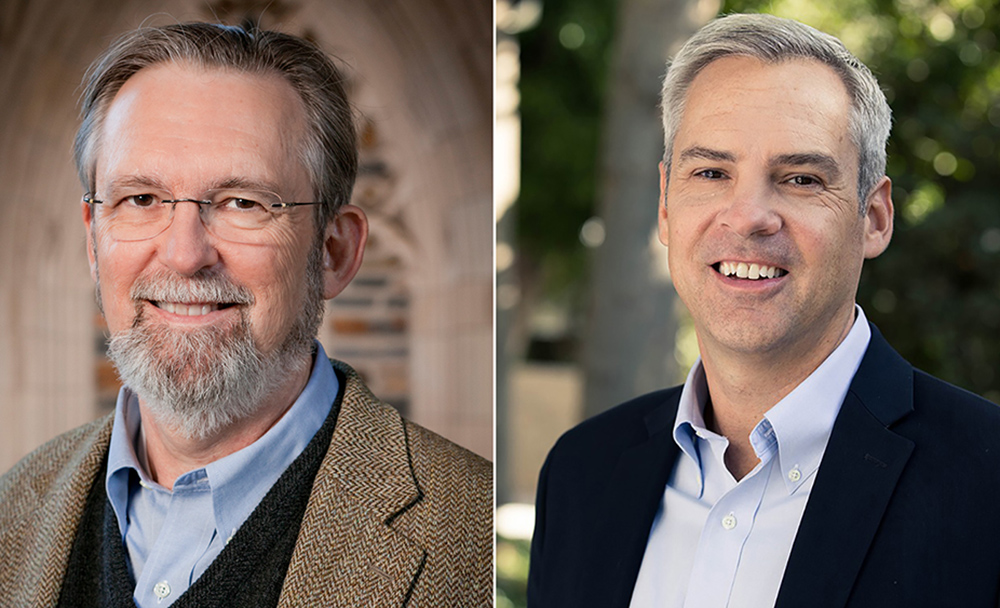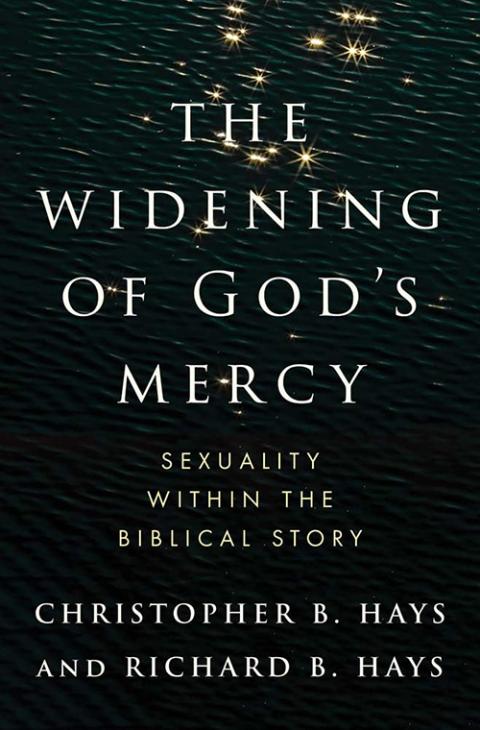
Richard B. Hays, left, and Christopher B. Hays, right. (Photos courtesy Duke, left, and Fuller, right)
Nearly 30 years ago, a revered New Testament professor at Duke Divinity School named Richard B. Hays published The Moral Vision of the New Testament, a sweeping 508-page meditation of Christian ethics in which Hays concluded that the Christian Bible condemns homosexual acts. Hays called homosexuality "one among many tragic signs that we are a broken people" and said that churches should not sanction or bless homosexual unions.
The book made Hays a darling among conservative evangelical Christians who opposed LGBTQ acceptance in their churches and the broader culture and frequently cited Hays' work in debates.
But the 75-year-old Hayes, since retired, now admits that his moral vision wasn't exactly 20/20 when it came to this issue in 1996, and he's ready to set the record straight. In a book scheduled to be released in September, The Widening of God's Mercy: Sexuality Within the Biblical Story, written with his son, Christopher B. Hays, the elder Hays makes an about-face that is already causing an uproar in evangelical circles.
With his son, a professor of Old Testament at Fuller Theological Seminary, Hays argues, in a preview of the book posted on his publisher's site, that a "dynamic and gracious God who is willing to change his mind … has already gone on ahead of our debates and expanded his grace to people of different sexualities" and includes "Richard Hays's epilogue reflecting on his own change of heart and mind."
Advertisement
In response to the news, prominent conservative Christian thinkers, perhaps unsurprisingly, displayed almost no curiosity about the actual arguments made in the book, which none of them have actually read. Instead, they erupted on social media with conjecture, hand-wringing and denunciations.
Denny Burk, a professor at a Southern Baptist college and president of the Council for Biblical Manhood and Womanhood who once admitted he had "been helped time and again" by Hays' scholarship, declared he was "deeply grieved" by the news.
Robert Gagnon, a professor of New Testament at Houston Baptist University, penned a nearly 1,500-word thread on X breathlessly attacking Hays' new book: "God hasn't changed his mind. Hays and son have changed their minds. They are now swimming in the sea of heresy, rejecting the clear and overwhelming witness of Scripture … ."
Christopher Yuan, a professor at Moody Bible Institute who has described himself as a Christian with "homosexual feelings," coyly speculated that the younger Hays had actually lured his father to apostasy: "Unfortunately, I've seen young adult children turn their previously biblical parents toward heresy, not more than once — including a president of a Bible college."
If you carefully attune your ear, you are liable to hear not only moral indignation but tinges of fear. These thinkers know well Hays' about-face is no small matter. Once dean of Duke Divinity School, he is widely considered a "heavyweight" in the field of biblical studies, and Moral Vision has long provided conservative Christians cover, bolstering their anti-LGBT arguments with academic heft.
As religion professor Anna Sieges said of Hays' reversal, "When faced with movement in larger Christian culture toward inclusion, white evangelicals could whip out chapter 16 and say, 'The guy all of you read in your seminaries agrees with us and has ended all debate on this issue.' "
That trump card has just fallen out of conservative Christians' deck, and the loss couldn't come at a worse time for them. When Moral Vision was first published, few notable Christian thinkers were making a biblical case in support of same-sex relationships. Now, it's difficult to keep track of them all, from New Testament scholar James Brownson's Bible, Gender, Sexuality to Christian ethicist David Gushee's Changing Our Mind.

"The Widening of God’s Mercy: Sexuality Within The Biblical Story," by Christopher B. Hays and Richard B. Hays. (Courtesy image)
The shifting winds sweeping the halls of academia lately are also blowing through the corridors of the church. An ever-expanding list of pastors, lay people and Christian social media influencers have also embraced LGBTQ inclusion in recent years. Even the Roman Catholic Church, which has long resisted movement on this issue, has shown signs of change under the leadership of Pope Francis.
In 2009, evangelical missiologist Ed Stetzer told me that conservative Christians who were pro-LGBTQ could all fit into a minivan. No exaggeration at the time, but in the years since, the minivan has become a caravan.
But conservative Christians who oppose LGBTQ inclusion still hold great power and maintain control of countless American institutions. Earlier this year, a senior employee at the seminary where the younger Hays teaches was fired for refusing to sign the school's statement on sexual standards, which says, "sexual union must be reserved for marriage, which is the covenant union between one man and one woman." In 2015, Fuller professor Daniel Kirk was refused tenure for disagreement over same-sex marriage.
At this time, Fuller has made no public statements in response to the book or the Hayses.
This day has been many years in the making. In June 2020, I posted on a social media thread saying, "it's a poorly kept secret that Richard Hays doesn't exactly stand by what he wrote about homosexuality … . Suffice to say, if Christians want to invoke Hays' arguments in (The Moral Vision) to contend for a traditionalist view, you should be aware that you're probably more enthusiastic about the content than the author is."
When news of Hays' forthcoming book broke over the weekend, however, not everyone on the left side of Christendom jumped for joy. Jimmy Hoke, a queer scholar, said, "Richard Hays has profited off queer bodies like mine for decades. Don't give him a penny more. I (and many other contingent queers) am barely scraping by."
An ever-expanding list of pastors, lay people and Christian social media influencers have also embraced LGBTQ inclusion in recent years.
As a gay man, I've had Hays' previous arguments weaponized against me in debates more times than I care to recall. I can sympathize with both the sentiment and the anger. But as theologian and poet Christian Wiman has written, "whatever faith you emerge with at the end of your life is going to be not simply affected by that life but intimately dependent upon it, for faith in God is, in the deepest sense, faith in life — which means, of course, that even the staunchest life of faith is a life of great change. It follows that if you believe at 50 what you believed at 15, then you have not lived — or have denied the reality of your life."
It's this deep spiritual truth that makes conservative culture warriors such as Gagnon, Burk and Yuan recoil in fear. For them, consistency is a synonym for faithfulness. A changing mind is not a sign of intellectual maturation, but cultural capitulation. Not growth, but compromise.
Believing that a thinking Christian should be allowed to change their mind, and that such change is actually a sign of faithfulness, is part of what sets a person like me apart from the conservative and fundamentalist wings of Christianity. This is perhaps the kind of thing that Paul is referring to when he speaks of being "transformed by the renewing of your mind."
Faithfulness means always being humble enough to acknowledge that you haven't fully figured everything out, being curious enough to evaluate new scholarship and arguments as they arise, and being honest enough to admit when you realize you've gotten something wrong. And when someone else does the hard work of walking this path, our mercy for them should be as wide as God's for us all.






